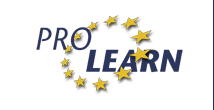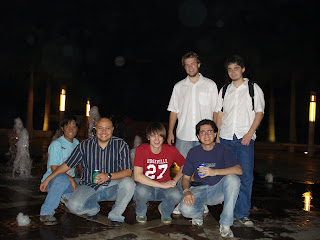OBJECTIVES
PROLEARN, the Network of Excellence in Technology Enhanced Learning for Professionals, now working under the umbrella of the EATEL Association (
http://www.ea-tel.eu/) and PALETTE, European Integrated Project aiming at developing interoperable web-services for Communities of Practice (
http://palette.ercim.org) are pleased to announce their joint 2008 Summer School.
Our ambition is to foster cross-domain training and collaboration opportunities among researchers in Europe and beyond, working in the disparate fields of expertise which promote the advancement of TEL at the workplace. The programme includes lectures and working sessions from leading professors in the field, tutoring, mentoring, and joint research opportunities. Additionally the school will offer practical sessions in research methodology for Technology Enhanced Learning.
Advanced PhD students will be identified to present their research at the Third European Conference on Technology Enhanced Learning in Maastricht, The Netherlands, September 17-19, 2008 (
http://www.ectel08.org), and to participate in EATEL thematic workshops.
PROGRAMME TOPICS- Collaborative Design between Educational Scientists and Computer Scientists
- Creation of and Access to Knowledge and Learning Resources
- Practice Modelling, Management & Mining
- Personalisation & Adaptation in Learning Environments
- Privacy and Security
- Pedagogy, Life-Long Learning, and TEL
- Individual, Social & Organisational Learning Processes
- Interoperability: TEL Standards, Models, Processes, Tools
- Research Techniques
- The Future of TEL
In order to increase social contacts among the summer school participants, the programme will include several social events. A variety of sport activities will also be offered to the summer school participants.
Cultural excursions are organised on the Sunday preceding the summer school and the Saturday which closes the summer school.
SUPPORT
This year the PROLEARN/EATEL - PALETTE joint Summer School will benefit from a special grant from SEEERA.NET to promote collaboration with the Western Balkan countries. The summer school has the pro-active support from a growing number of EU IST and eContent funded R&D projects such as APOSDLE, MATURE, iCAMP, PROLIX, MACE, TENCompetence, GRAPPLE, and ARIADNE.
VENUE DESCRIPTIONMagnificent and exciting, mysterious and surprising, Ohrid is one of the most ancient towns in Europe, flavoured with a taste of centuries gone by, full of Hellenistic, Roman, Slavic, Byzantine, and Turkish memories. During the classical and medieval periods Orhid was the artistic, cultural and spiritual centre of the Balkans and has been called a notable bridge of European art. The town is proud of its rich cultural heritage and unique lake which both belong to UNESCO's World Cultural and Natural Heritage (
http://www.ohrid.com.mk).
ACCOMODATION AND SOCIAL EVENTSAccommodation and summer school facilities will be made available at Hotel Granit (
http://www.hotelgranit.com.mk). Granit Hotel is located on the coast of Lake Ohrid in St. Stefan, 5 km from the centre of Ohrid. It is 12 km from the Ohrid airport. The Hotel has two harbours which enable access to the hotel and the beach from the lake. The wonderful woods which surround St. Stefan Monastery are located 1 km from the Granit Hotel.
PhD students are asked to share a double room with other PhD students.
COST OF SUMMER SCHOOLThe cost for PhD students is Euro 500 (including accommodation - 7 nights in double room, meals, and excursions). PROLEARN - PALETTE Summer School 2008 will offer 50 scholarships to PhD students to cover summer school accommodation, catering, and events. Please indicate if you are applying for a scholarship in your application.
ELIGIBILITY AND APPLICATION PROCESSThe summer school is intended for PhD students investigating issues related to Technology Enhanced Learning and making progress on their dissertation research.
PhD students are invited to submit applications to
mailto:summerschool@i5.informatik.rwth-aachen.de. The application should include a Curriculum Vitae and a summary (not to exceed 5 pages including references and any figures, tables, etc.) describing the student's dissertation. The deadline for submissions is March 15th, 2008. To ensure a high ratio between tutors and students the school will be limited to 60 PhD students. We look forward to seeing you at the summer school!
CALENDARMarch 15th, 2008: Deadline for submitting applications to the Summer School
May 1st, 2008: Notification of acceptance
May15th, 2008: Pre-Summer School videoconferences begin
June 15th, 2008: Summer School begins
ORGANISING COMMITTEELocal Chair:
Klime Poposki (St. Kliment Ohridski University), klime.poposki@uklo.edu.mk
Programme Co-Chairs:
Luc Vandenabeele (Centre de recherche public Henri Tudor), luc.vandenabeele@tudor.lu Stefanie Lindstaedt (Know Center), slind@know-center.at
Liliane Esnault (E.M. Lyon), esnault@em-lyon.com
Martin Wolpers (Fraunhofer), martin.wolpers@fit.fraunhofer.de
Summer School Website:
Mohamed Amine Chatti (RWTH Aachen), chatti@informatik.rwth-aachen.de
Summer School Promotion:
Margit Hofer (CSI), hofer@zsi.at,
Collaborative Learning Support:
Ambjörn Naeve (KTH), amb@nada.kth.se
Peter Scott (OU), peter.scott@open.ac.uk
Finances:
Fridolin Wild (Vienna University of Economics and Business Administration), fridolin.wild@wu-wien.ac.at
General Co-Chairs:
Katherine Maillet (INT), Katherine.Maillet@int-edu.eu
Ralf Klamma (RWTH Aachen), klamma@informatik.rwth-aachen.de Tomaz Klobucar (IJS), tomaz@e5.ijs.si
PROGRAMME COMMITTEEAndrej Afonin, Lithunia
Olivier Bohl, Germany
Zuzana Bizonova, Slovakia
Daniel Burgos, Spain
Bernadette Charlier, Switzerland
Mohamed Amine Chatti, Germany
Alexandra Christea, United Kingdom
Hannes Ebner, Sweden
Liliane Esnault, France
Luc Vandenabeele, Switzerland
Denis Gillet, Switzerland
Ashley Healy, United Kingdom
Maurice Hendrix, The Netherlands
Margit Hofer, Austria
Patrick Johnscher, Germany
Anna-Kaarina Kairamo, Finland
Ralf Klamma, Germany
Styliani Kleanthous, Greece
Tomaz Klobucar, Slovenia
Tobias Ley, Austria
Katrina Leyking, Germany
Stefanie Lindstaedt, Austria
Matthias Lux, Austria
Katherine Maillet, France
Mark Melia, Ireland
Ambjörn Naeve, Sweden
Wolfgang Nejdl, Germany
Klime Poposki, Macedonia
Peter Scott, United Kingdom
Steinn E. Sigurðarson, Austria
Martin Sillaots, Estonia
Marcus Specht, The Netherlands
Armin Ulbrich, Austria
Fridolin Wild, Austria





































